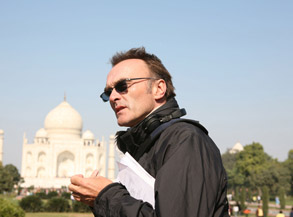BOP Interview: Danny Boyle
By Ryan Mazie
November 4, 2010
How can you make an action movie when the hero cannot move? Leave it up to Academy Award winning director Danny Boyle (Sunshine, 28 Days Later) to ask that question. Luckily, he has his own answer. 127 Hours, his first film after Slumdog Millionaire, is already hot with Oscar buzz.
127 Hours tells the true story of outdoorsman extraordinaire Aron Ralston (James Franco), whose arm gets pinned under a rock in a hiking accident. Aron is stuck for the titular, painstaking amount of time with a little bit of water, a camera, and a dull pocketknife. The last item comes in handy for the film’s most jarring scene, which has received attention due to reports of fainting from the audiences. Sitting down at the Ritz Carlton in Boston for a roundtable interview, Boyle talks about the chilling aforementioned scene, audience reactions, life after Slumdog, and the answer to the million dollar question: Is James Franco really as stoned as he looks?
When did you first hear about Aron’s story and when did it strike you as being theatrical?
Danny Boyle: I live in London and heard about it when it first came out. It’s one of those stories that snag you. Obviously, it’s on a different scale. The Chilean miners at the moment, everyone is fascinated by them. I felt that way about Aron's story. I heard about him getting pulled out, and then I heard the press conference he gave when he came out of the hospital. Then, I read his book in 2006. I’ve tried to make the film twice before. I tried to make it then. I asked him and he didn’t want to. He wanted to make a documentary where I wanted to make it a first-person immersive experience. I always thought that it would be an amazing film.
I think it is because, when you are in the cinema, you are in a black box as well. It’s not like television. You are in a black box, all of you together, and you are trapped as well. I mean, you can walk out, but if you are enjoying it, you are committed to it. In fact, you paid money to go into that black box as well so you are unlikely to leave it unless it’s shit (laughs). It’s true, isn’t? You pay twelve bucks or whatever it is, you are committed to seeing it through. And I thought if you can get that right, that experience of living in that confined space with him, it would be something the audience could share. So I loved that idea about it.
Most importantly, the only way you will ever be able tolerate watching this man cut his arm off - and doing it properly, it takes him 40 minutes - is if you are invested in it. If you want him to do it. If you want to help him in a way and you want him to get out of there, because you want to get out of the black box as well. I said to the studio while we were setting it up that’s the only way you will ever tolerate it. And I think, aside from the few people who fainted, most people go, “Yeah! You can get out of there. You can overcome it.” I think that’s the essence of this story, that connection.
Continued:
1
2
3
4
5
|
|
|
|




